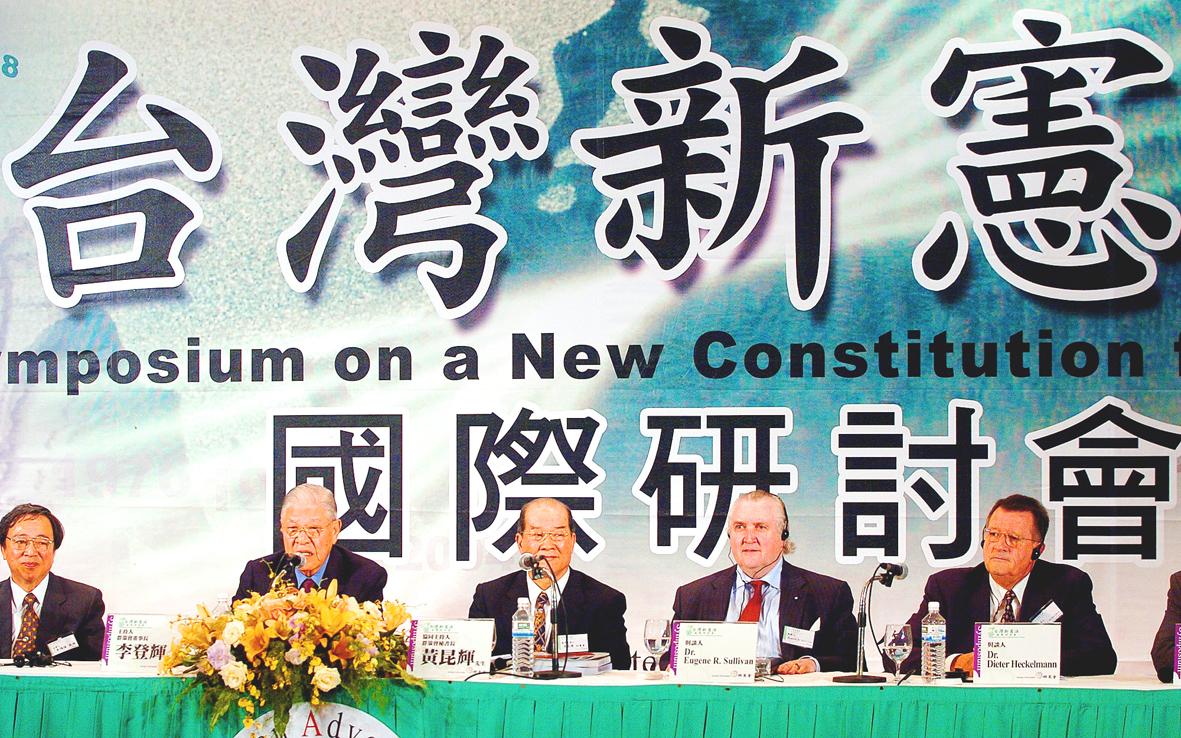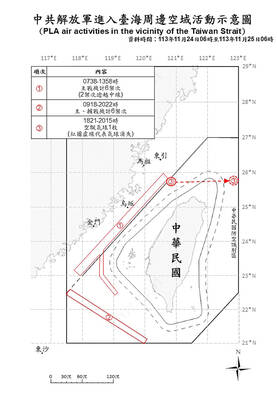Former president Lee Teng-hui (李登輝) made great contributuons to Taiwan, including democratization, strengthening national sovereignty and enhancing people’s identity as Taiwanese, former Presidential Office secretary-general Huang Kun-huei (黃昆輝) said on Thursday after Lee died in Taipei aged 97.
“Lee devoted a deep love to Taiwan throughout his entire life,” said Huang, 83, who served in several other positions during Lee’s presidency, including mainland affairs council minister and minister of the interior.
When Lee stepped down as president, Huang remained a close aide, serving as president of the Lee and Lien Education Foundation, secretary-general of Taiwan Advocates, a think tank founded by Lee in 2002, and chairman of the Taiwan Solidarity Union, the political party that regards Lee as its spiritual leader.

Photo: Peter Lo, Taipei Times
Lee had great insight into global events and a vision of Taiwan’s national development, and he staunchly believed that democracy was the only road for the nation to tread, Huang said.
To establish democratic institutions in Taiwan, Lee overcame several major obstacles posed by the ruling Chinese Nationalist Party (KMT), which was predominately controlled by conservative forces, given that the party has ruled Taiwan since its retreat from China in 1949 after losing the Chinese Civil War to the Chinese Communist Party (CCP), he said.
Shortly after that retreat, the KMT had imposed martial law, which lasted for 38 years until then-president Chiang Ching-kuo (蔣經國) lifted it in 1987.
When Chiang died the following year, then-vice president Lee succeeded him, becoming the first Taiwan-born president of the nation, as opposed to his predecessors who were born in China.
Huang lauded Lee’s efforts in 1991 to push for the re-election of the National Assembly, dubbed the “10,000-year National Assembly,” and the Legislative Yuan, whose members had served since 1948, by advocating the passage of the First Addition to the Constitution, which provided the legal basis for Taiwanese to elect their own representatives.
That was anything but easy, as it required lawmakers to amend the Constitution to “kick themselves off the stage,” but Lee completed the task, bringing Taiwan one step closer to democracy, Huang said.
To establish direct presidential elections by popular vote, Lee established a task force dedicated to the effort within the KMT, but the idea was met with strong opposition from some party members, who feared that it could eventually lose its grip on power if voters elected a president who does not “represent China” as the KMT does, he said.
The KMT postponed the task force for two years to prevent party rifts from widening, he added.
However, after sensing public opinion was in favor of direct presidential elections, Lee changed the composition of the KMT’s Central Standing Committee by allowing mayors, county commissioners and council speakers to become members, Huang said.
Many of these politicians were of the same mind as Lee, and KMT voices advocating direct presidential elections grew louder before the Third Addition to the Constitution — which established that the nation’s president and vice president should be directly elected — was passed in 1994, he said.
Lee became Taiwan’s first directly elected president in 1996.
“I, Lee Teng-hui, promise that I will not hold grudges against anybody while I am on this Earth. I expect myself to be like a plowing bull and guard the country in every step I take. I will respond to public opinion and never stop working for my beloved Taiwan,” Huang quoted Lee as saying after he was elected.
Huang said that Lee’s benevolence and love for the nation had touched his heart.
After the 1996 election, Lee was greatly concerned that China would continue to suppress Taiwan’s international space and deny the fact that the Republic of China was an independent state, so he began efforts to raise the global profile of Taiwan, Huang said.
Lee promoted “pragmatic” diplomacy with other nations against the backdrop of the CCP’s “one China” principle and its claims to Taiwan, he said.
In a 1999 interview with Voice of Germany, Lee said that relations between Taiwan and China should be on a “special state-to-state” basis, if not a “state-to-state” basis, he added.
Lee was trying to send a message to Taiwanese at home and abroad about “the clear national sovereignty of Taiwan,” which has greatly influenced how Taiwanese identify themselves, Huang said.
It was a major milestone in the development of Taiwan, he said.
The international community also received the message that Taiwan was an independent state, not “an inseparable part of the People’s Republic of China,” he added.
Lee’s efforts to deepen Taiwan’s democracy did not stop when he stepped down as president in 2000, as he went on to found the Lee Teng-hui Foundation and the Lee Teng-hui Academy, which aimed to cultivate more young people who identified with and loved Taiwan, Huang said.
Lee also led academics to compile a series of books on Taiwan on topics ranging from history and geography to literature and music, he said.
“I was greatly saddened by his death, but Lee will continue to live in Taiwanese hearts forever,” Huang said.

A decision to describe a Chinese Ministry of Foreign Affairs statement on Singapore’s Taiwan policy as “erroneous” was made because the city-state has its own “one China policy” and has not followed Beijing’s “one China principle,” Deputy Minister of Foreign Affairs Tien Chung-kwang (田中光) said yesterday. It has been a longstanding practice for the People’s Republic of China (PRC) to speak on other countries’ behalf concerning Taiwan, Tien said. The latest example was a statement issued by the PRC after a meeting between Singaporean Prime Minister Lawrence Wong (黃循財) and Chinese President Xi Jinping (習近平) on the sidelines of the APEC summit

Taiwan’s passport ranked 34th in the world, with access to 141 visa-free destinations, according to the latest update to the Henley Passport Index released today. The index put together by Henley & Partners ranks 199 passports globally based on the number of destinations holders can access without a visa out of 227, and is updated monthly. The 141 visa-free destinations for Taiwanese passport holders are a slight decrease from last year, when holders had access to 145 destinations. Botswana and Columbia are among the countries that have recently ended visa-free status for Taiwanese after “bowing to pressure from the Chinese government,” the Ministry

HEALTHCARE: Following a 2022 Constitutional Court ruling, Taiwanese traveling overseas for six months would no longer be able to suspend their insurance Measures allowing people to suspend National Health Insurance (NHI) services if they plan to leave the country for six months would be abolished starting Dec. 23, NHIA Director-General Shih Chung-liang (石崇良) said yesterday. The decision followed the Constitutional Court’s ruling in 2022 that the regulation was unconstitutional and that it would invalidate the regulation automatically unless the NHIA amended it to conform with the Constitution. The agency would amend the regulations to remove the articles and sections that allow the suspension of NHI services, and also introduce provisional clauses for those who suspended their NHI services before Dec. 23, Shih said. According to

‘GRAY ZONE’ TACTICS: China continues to build up its military capacity while regularly deploying jets and warships around Taiwan, with the latest balloon spotted on Sunday The US is drawing up contingency plans for military deployments in Japan and the Philippines in case of a Taiwan emergency, Japan’s Kyodo news agency reported. They would be incorporated in a first joint operation plan to be formulated in December, Kyodo reported late on Sunday, citing sources familiar with Japan-US relations. A US Marine Corps regiment that possesses High Mobility Artillery Rocket Systems — a light multiple rocket launcher — would be deployed along the Nansei Island chain stretching from Kyushu to Yonaguni near Taiwan, Kyodo said. According to US military guidelines for dispatching marines in small formations to several locations,